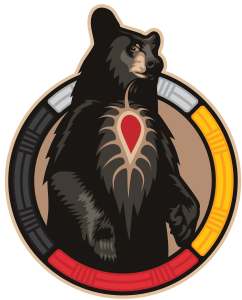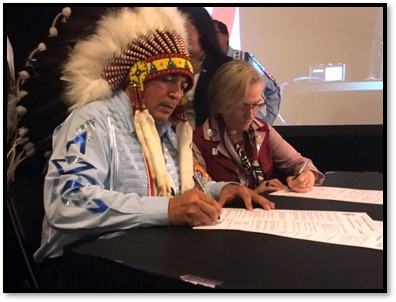
In Connection 1, you will learn why relationship is the cornerstone of working meaningfully with Indigenous peoples and how to be a good partner rather than someone who “helps” Indigenous peoples.
Working in Relationship with Indigenous Communities
In the following video Working in Relationship with Indigenous Communities (Peltier & Nipissing IMN-Ontario Team, 2018) [6:30], former Nipissing University President Dr. Mike DeGagné, speaks about why self-determination and empowerment are critical concepts in working with Indigenous peoples. Elder Carol Guppy-ba* reminds us to keep an open mind and listen well to community. Dr. Susan Srigley shares that when relationship is the goal our learning will continue in a good way. Following the video, you will be asked to recall and reflect on what you’ve learned in Checkpoint 1.
*”ba” indicates Carol Guppy has passed on to the Spirit World.
Video Transcript: Working in Relationship with Indigenous Communities [Doc]![]()
Key Messages from the Video
Key messages highlighted in this video:
- Keep an open mind.
- Listen well to other perspectives.
- Relationship should be your goal.
- Skills, expertise, and credentials are part of, but not the end of learning because you are always a learner.
Checkpoint 1: Relationship is critical in working with Indigenous Peoples
Reflecting on what you’ve learned in the video, complete the drag and drop activity below.
Exploring Foundational Reports for Working with Indigenous Peoples
In the Working in Relationship with Indigenous Communities video, Dr. DeGagné mentioned three important documents involving relationships with Indigenous peoples. They are:
- Royal Commission on Aboriginal Peoples

- Truth and Reconciliation Commission of Canada: Calls to Action

- Principles Respecting the Government of Canada’s Relationship With Indigenous Peoples

You can further explore these documents to read the many recommendations that have been made by the Federal Government and Indigenous peoples. It is notable that many of those recommendations from the Royal Commission on Aboriginal Peoples (1996) still appear in the Truth and Reconciliation Commission’s Calls to Action (2015). An important observation is that these documents call for building relationships from a place of respect for another’s perspective.

Checkpoint 2: The Royal Commission on Aboriginal Peoples
In the Royal Commission on Aboriginal Peoples (1996) report, ‘healing’ was identified as a very high priority for change. Consider this quote from Volume 3: Gathering Strength:
“The word ‘healing’ is familiar to non-Aboriginal people, of micro-credential, but the idea that Aboriginal people have in mind when they use it is likely not. Healing, in Aboriginal terms, refers to personal and societal recovery from the lasting effects of oppression and systemic racism experienced over generations. Many Aboriginal people are suffering not simply from specific diseases and social problems, but also from a depression of spirit resulting from 200 or more years of damage to their cultures, languages, identities and self-respect. The idea of healing suggests that to reach ‘whole health’, Aboriginal people must confront the crippling injuries of the past. Yet, doing so is not their job alone. Only when the deep causes of Aboriginal ill health are remedied by Aboriginal and non-Aboriginal people working together will balance and harmony — or health and wellbeing — be restored” (RCAP Volume 3 Gathering Strength, 1996, p. 100).
What is your role in healing? Answer by either recording yourself speaking or by taking notes. Be sure to download a copy of your audio clip or notes before proceeding on.
The Truth and Reconciliation Commission (TRC) of Canada Calls to Action
Read the document below to explore The Truth and Reconciliation Commission’s 94 Calls to Action. Since the Calls to Action 18-24 specifically address Aboriginal health in Canada, we offer a deeper dive into their meaning and significance.
Call to Action 18
In the following video [00:31] hear Honourable Justice Murray Sinclair read TRC Call to Action 18.
Video transcript: We call upon the federal, provincial, territorial, and Aboriginal governments to acknowledge that the current state of Aboriginal health in Canada is a direct result of previous Canadian government policies, including residential schools, and to recognize and implement the health-care rights of Aboriginal peoples as identified in international law, constitutional law, and under the Treaties.
Call to Action 19
In the following video [00:41] hear Honourable Justice Murray Sinclair read TRC Call to Action 19.
Video transcript: Nineteen. We call upon the federal government, in consultation with Aboriginal peoples, to establish measurable goals to identify and close the gaps in health outcomes between Aboriginal and non-Aboriginal communities, and to publish annual progress reports and assess longterm trends. Such efforts would focus on indicators such as: infant mortality, maternal health, suicide, mental health, addictions, life expectancy, birth rates, infant and child health issues, chronic diseases, illness and injury incidence, and the availability of appropriate
health services.
Call to Action 20
In the following video [00:20] hear Honourable Justice Murray Sinclair read TRC Call to Action 20.
Video transcript: Twenty. In order to address the jurisdictional disputes concerning Aboriginal people who do not reside on reserves, we call upon the federal government to recognize, respect, and address the distinct health needs of the Métis, Inuit, and off-reserve Aboriginal peoples.
Call to Action 21
In the following video [00:25] hear Honourable Justice Murray Sinclair read TRC Call to Action 21.
Video transcript: Twenty-one. We call upon the federal government to provide sustainable funding for existing and new Aboriginal healing centres to address the physical, mental, emotional, and spiritual harms caused by residential schools, and to ensure that the funding of healing
centres in Nunavut and the Northwest Territories is a priority.
Call to Action 22
In the following video [00:23] hear Honourable Justice Murray Sinclair read TRC Call to Action 22.
Video transcript: Twenty-two. We call upon those who can effect change within the Canadian health-care system to recognize the value of Aboriginal healing practices and use them in the treatment of Aboriginal patients in collaboration with Aboriginal healers and Elders where requested by
Aboriginal patients.
Call to Action 23
In the following video [00:25] hear Honourable Justice Murray Sinclair read TRC Call to Action 23.
Video transcript: Twenty-three. We call upon all levels of government to: 1) Increase the number of Aboriginal professionals working in the health-care field. 2) Ensure the retention of Aboriginal health-care providers in Aboriginal communities. 3) Provide cultural competency training for all healthcare professionals.
Call to Action 24
In the following video [00:32] hear Honourable Justice Murray Sinclair read TRC Call to Action 24.
Video transcript: Twenty-four. We call upon medical and nursing schools in Canada to require all students to take a micro-credential dealing with Aboriginal health issues, including the history and legacy of residential schools, the United Nations Declaration on the Rights of Indigenous Peoples, Treaties
and Aboriginal rights, and Indigenous teachings and practices. This will require skills-based training in intercultural competency, conflict resolution, human rights, and anti-racism.
Checkpoint 3: TRC Calls to Action
Read the CBC News article As Echaquan inquiry wraps up, supporters take to streets and coroner promises a way forward [article]![]() and watch two associated videos (Coroner hopes to build foundational change as Joyce Echaquan inquiry concludes and Quebec’s first Indigenous surgeon optimistic as Echaquan inquiry ends) included within the article, then return to this checkpoint to respond to the question below.
and watch two associated videos (Coroner hopes to build foundational change as Joyce Echaquan inquiry concludes and Quebec’s first Indigenous surgeon optimistic as Echaquan inquiry ends) included within the article, then return to this checkpoint to respond to the question below.
Which 2 Calls to Action best address the issues in this article?
Principles Respecting the Government of Canada’s Relationship With Indigenous Peoples
Principles Respecting the Government of Canada’s Relationship With Indigenous Peoples [PDF]![]()
Checkpoint 4: Principles Respecting Canada’s Relationship With Indigenous Peoples
Which principle outlines the fact that Indigenous cultural groups are unique and may require an understanding of their unique perspectives?
Connection 1 Summary
In Connection 1, we learned:
- Working in relationship with Indigenous Peoples is key
- To work in relationship, you must listen and offer space for other perspectives
- Your role is to partner with rather than “help” Indigenous peoples

To move on to Connection 2, click on the “Next: Connection 2: Existing Gaps in the Indigenous Health Context →” button at the bottom right hand corner of this page.
References
Canada & The Royal Commission on Aboriginal Peoples. (1996).Report of the Royal Commission on Aboriginal Peoples (RCAP). Canada Communication Group.https://www.bac-lac.gc.ca/eng/discover/aboriginal-heritage/royal-commission-aboriginal-peoples/Pages/final-report.aspx![]()
Canada & The Royal Commission on Aboriginal Peoples. (1996).Report of the Royal Commission on Aboriginal Peoples (Vol. 3. Gathering Strength). Canada Communication Group.http://data2.archives.ca/e/e448/e011188230-03.pdf![]()
Canada & Department of Justice Canada. (2018).Principles respecting the Government of Canada’s relationship with Indigenous Peoples[Poster].https://justice.gc.ca/eng/csj-sjc/postereng.pdf![]()
CBC News. (2022, June 17). Beyond 94 Truth and reconciliation in Canada: 18. Recognize and implement the health-care rights of Aboriginal people. https://www.cbc.ca/newsinteractives/beyond-94/recognize-and-implement-the-health-care-rights-of-aboriginal-people![]()
CBC News. (2022, June 17). Beyond 94 Truth and reconciliation in Canada: 19. Identify and close the gaps in health outcomes between Aboriginal and non-Aboriginal communities. https://www.cbc.ca/newsinteractives/beyond-94/identify-and-close-the-gaps-in-health-outcomes-between-aboriginal-and-non-aboriginal-communities![]()
CBC News. (2022, June 17). Beyond 94 Truth and reconciliation in Canada: 20. Recognize, respect, and address the distinct health needs of the Métis, Inuit, and off-reserve Aboriginal peoples. https://www.cbc.ca/newsinteractives/beyond-94/recognize-respect-and-address-the-distinct-health-needs-of-the-metis-inuit-and-off-reserve-aboriginal-peoples![]()
CBC News. (2022, June 17). Beyond 94 Truth and reconciliation in Canada: 21. Provide sustainable funding for existing and new Aboriginal healing centres. https://www.cbc.ca/newsinteractives/beyond-94/provide-sustainable-funding-for-existing-and-new-aboriginal-healing-centres![]()
CBC News. (2022, June 17). Beyond 94 Truth and reconciliation in Canada: 22. Recognize the value of Aboriginal healing practices and use them in the treatment of Aboriginal patients. https://www.cbc.ca/newsinteractives/beyond-94/recognize-the-value-of-aboriginal-healing-practices-and-use-them-in-the-treatment-of-aboriginal-patients![]()
CBC News. (2022, June 17). Beyond 94 Truth and reconciliation in Canada: 23. Increase the number of Aboriginal professionals working in the health care field. https://www.cbc.ca/newsinteractives/beyond-94/increase-the-number-of-aboriginal-professionals-working-in-the-health-care-field![]()
CBC News. (2022, June 17). Beyond 94 Truth and reconciliation in Canada: 24. Require all medical and nursing students to take a micro-credential dealing with Aboriginal health issues. https://www.cbc.ca/newsinteractives/beyond-94/require-all-medical-and-nursing-students-to-take-a-micro-credential-dealing-with-aboriginal-health-issues![]()
Page, J. & Leavitt, S. (2021, June 2). As Echaquan inquiry wraps up, supporters take to streets and coroner promises a way forward. https://www.cbc.ca/news/canada/montreal/quebec-coroner-s-inquiry-joyce-echaquan-final-day-1.6050235![]()
Peltier, C. & Nipissing IMN-Ontario Team. (2018).Working in relationship with Indigenous communities[Video]. Vimeo.https://vimeo.com/276901016![]()
Truth and Reconciliation Commission of Canada. (2015).Truth and Reconciliation Commission of Canada: Calls to action.https://ehprnh2mwo3.exactdn.com/wp-content/uploads/2021/01/Calls_to_Action_English2.pdf![]()

